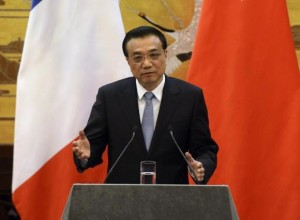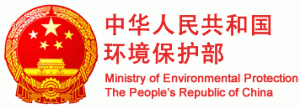Not only is pollution is shortening lives in the world’s most populous nation, but it is also an inescapable reminder of the trade-offs at the heart of China’s transition from a developing country into a prosperous, modern nation. While the Communist Party has been legitimized by the thriving economy, it now needs to balance the rush for economic growth against the threats to life and health.

Chinese Premier Li Keqiang gives an address during a news conference in the Great Hall of the People in Beijing December 6, 2013. Photo courtesy of Resuters/Mark Ralston
China’s premier, Li Keqiang, has declared “war on pollution,” saying that the country would tackle it with the same determination it has used to fight poverty in the past three decades. Spoken at the annual meeting of the National People’s Congress earlier this year in March, Li’s remarks reflect government recognition of public displeasure over pollution and its impact on people’s health. Garlic Liu, a college student in Beijing said in an in person interview (Liu is currently studying abroad in Columbia University) “I can’t go out everyday. I have to choose when to go out so I don’t make my asthma worse. All my friends do the same thing. We hang out not when it is convenient for us but when it’s convenient for the weather. We all have a pollution app on our phones to check when it’s a good day.”
To battle this “war,” the Chinese government has recently promoted a range of policies and measures intended to both protect the environment and clean up the pollution: shutting down small and inefficient coal plants, banning the building of new coal-fired power plants in key economic zones, putting caps on coal consumption, considering the implementation of an environmental pollution tax, etc. To offset the reduced dependence on coal, the government is also looking to expand the energy reserves coming from other fuel sources, namely, natural gas, wind, solar, hydroelectric, and nuclear power. To cut vehicle emissions it plans to remove from the roads all cars registered prior to 2005, require the use of the much cleaner China V gasoline, promote the development and use of green vehicles, and expand the public transit systems.
However, these measures are not likely to have lasting change unless Beijing tackles what has proved as the root of the pollution: ineffective implementation and enforcement of environmental laws and regulations. Ineffective implementation is due to the contradictory message the Beijing government sends to local officials. While the government in Beijing determines environmental policies and measures, the responsibility for their implementation is given to local officials. However, at the same time the government in Beijing presses local officials to pursue economic growth above all else. Jia Xu, a Columbia University professor who has experience working in the Chinese government said, “the Beijing government considers the development of the local economy the greatest factor in assessing performance and deciding promotions and demotions. It only makes sense that because of this government officials value the economy more than the environment. They are paid to do so.” Thus, if China is committed to this recent declaration of war, it must redefine its calculus for grading and rewarding the performance of local officials. To this end, following the “declaration of war”, Chinese officials announced that they were offering a total of 10 billion renminbi, or $1.65 billion, this year to cities and regions that make “significant progress” in air pollution control.
While ineffective implementation can be resolved by clearly prioritizing the environment at the local official level, the lack of enforcement of environmental policy and law can be resolved by strengthening the central government. The government can propose and talk of a ‘war on pollution’, but if there is no central administrative body with real authority, power and resources to monitor and enforce the environmental agenda, the war will not easily be won.

Seal of China’s Ministry of Environmental Protection. Photo courtesy of the ministry’s government website.
Today, responsibility for environmental monitoring is divided among at least six state ministries and agencies, often with different goals in each ministry. This results in disparate environmental authority that is too weak to enforce policy. According to Meeyan Liu, a judge in Beijing, in an interview “bold structural reform is needed. Beijing needs to unify the Ministry of Environmental Protection (MEP) and give it the power it needs to do its job. Right now it’s a showcase department that is just there to show the people that the government is doing something for the environment.” The MEP is the youngest ministry that was recognized in 2008; it has a staff of 300 while the U.S. EPA has more than 17,000 employees. “If the Chinese government is committed to winning the war on pollution, it is time to give the state ministry staff, funding and authority that reflects that commitment” said Liu.
Due to the modernization of the nation and the increased availability of technology, Chinese citizens are increasingly turning online to vent their anger over pollution. When record-breaking smog blanketed northeastern China in January earlier this year, the Chinese public knew about it instantly because of the pollution apps on their smartphones and thus quickly went online to post their anger over the pollution. The government in Beijing rolled out new anti-pollution measures within days.
Weibo, China’s Twitter-like microblog service has been used to publicize environmental crises. In a Weibo post, activist Deng Fei accused aluminum smelters in Weifang, a city in China, of illegally pumping wastewater underground into pressurized wells. During the lunar New Year, many of Mr. Deng’s 3 million followers posted images of the polluted rivers and streams in their hometowns when they returned home for the holidays.
“With Weibo, any person can be a reporter,” says Mr Deng. “Before Weibo, information was monopolized by mainstream and official media, and there weren’t many channels to express different voices.” Mr. Deng and others like him are at the forefront of a growing environmental movement that has become more powerful as local governments become more responsive to what is said online.
Bernhard Schwartländer, the World Health Organization’s China representative, said, “something has to happen, and it can happen, but it’s a long term agenda that needs leadership, bold decisions, and resources. It also needs clear recognition of the problem from everybody. If the public is co-opted to monitoring pollution it would be a major step for society.”